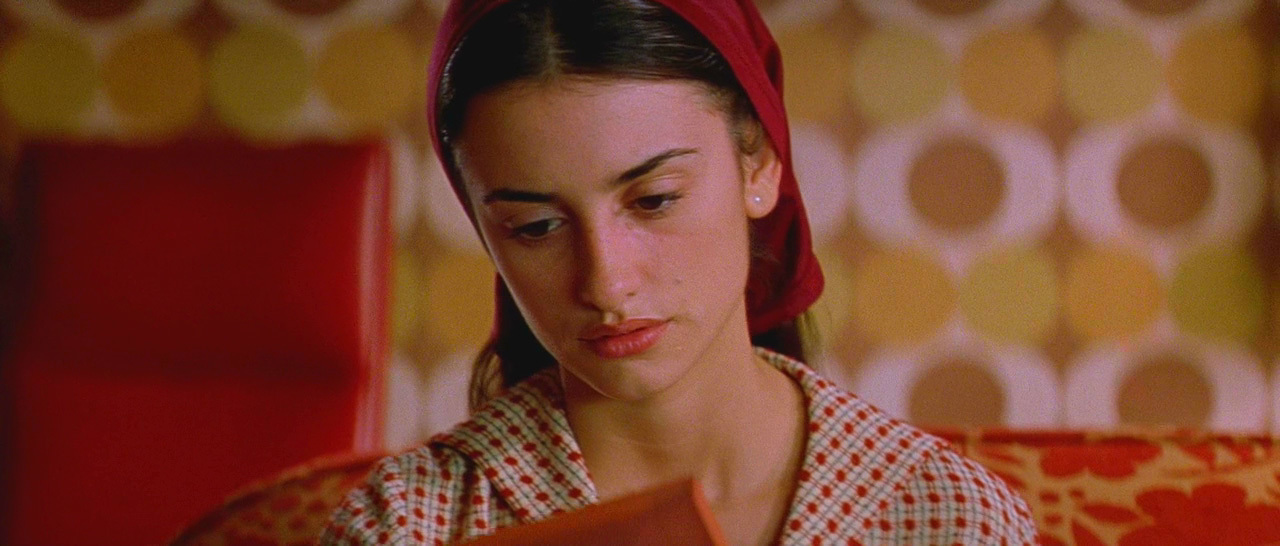Women on the Verge of a Nervous Breakdown (1988)
Almodóvar’s sixth film was the first to earn him widespread international attention as well as success in his native Spain. Women on the Verge of a Nervous Breakdown is enough of a romp to have since been turned into a Broadway and West End musical, but Almodóvar’s black comedy also packs a hefty feminist punch. When TV actress Pepa (Carmen Maura) is deserted by her married lover Iván (Fernando Guillén), she embarks on a frenzied quest to track him down, which inadvertently brings her into contact with Iván’s wife Lucía (Julieta Serrano), son Carlos (Antonio Banderas) and his son’s snobby fiancée Marisa (iconic Almodóvar actress Rossy de Palma). With plot developments including a looming terrorist threat, a duplicitous therapist and, most memorably of all, a gazpacho spiked with sleeping pills, Women on the Verge of a Nervous Breakdown is obviously pretty camp; it’s also supremely stylish and defined by Almodóvar’s eye-poppingly bright visuals. But at the same time, this film manages to deliver a subtly empowering message as it hurtles towards its final scene revelation; namely: even women who appear brittle can show tremendous resilience.
All About My Mother (1999)
Probably Almodóvar’s best-known and most acclaimed film, All About My Mother is a moving melodrama which delves into modern issues like AIDS and transsexuality while offering lots of affectionate nods to Hollywood’s golden age: the title is a riff on the classic Bette Davis film All About Eve. The narrative follows a woman named Manuela (Cecilia Roth) who reconnects with her former lover Lola (Toni Cantó), a trans sex worker, after their teenage son is tragically killed in a car accident. As ever, womanhood and female friendship are core themes as Manuela forges close bonds with another trans sex worker called Agrado (Antonia San Juan) and kind-hearted nun Rosa (Penélope Cruz), who is secretly carrying Agrado’s child. On paper, some of Almodóvar’s plot twists could seem schlocky, but he paints these characters with such warmth and nuance that All About My Mother never threatens to devolve into some kind of offbeat soap opera. In one especially memorable scene, Agrado explains touchingly why she is prepared to pay so much for her cosmetic surgery: “It costs a lot to be authentic, ma’am. And one can’t be stingy with these things because you are more authentic the more you resemble what you’ve dreamed of being.” Amen to that.
Talk to Her (2002)
Almodóvar’s follow-up to All About My Mother is a more sombre and melancholy offering about an unusual friendship that develops between two men who meet while caring for women in comas. Benigno (Javier Cámara) is a hospital nurse assigned to look after Alicia (Leonor Watling), a beautiful dancer he had previously idolised from a distance, while Marco (Darío Grandinetti) is a journalist tending to his girlfriend Lydia (Rosario Flores) who has been injured in a bullfighting accident. As the stories behind each man’s relationship with his patient unfold in flashback, Almodóvar invites us to compare (and perhaps judge) Benigno’s one-sided obsession with Alicia next to Marco’s reciprocated love for Lydia. Almodóvar is rightly hailed as a great creator of female characters, but Talk to Her shows he can also explore the male psyche with sensitivity and insight. Even in the film’s most provocative scene, arguably the most shocking Almodóvar has ever shot, he shows compassion for Benigno as he commits a terrible act of violence against Alicia. Some vibrant dance scenes inspired by iconic German performer Pina Bausch (who is seen at the start and end of the film) add toTalk to Her‘s slow-burning power.
Bad Education (2004)
Almodóvar’s imperial phase continued with this dark and disturbing drama which definitely shouldn’t be confused with the laddy Jack Whitehall sitcom of the same name. Here the director uses a “film within a film” structure as he tells the story of talented young film director Enrique (Fele Martínez) and wannabe actor Ángel (Gael García Bernal), who were once childhood friends and one another’s first love. When Ángel brings Enrique a short story based on their own shared history and persuades him to make it into a film, we glide into a second narrative about two boys who fall in love in a Catholic school in the ’60s before one of them is molested by an overbearing priest called Father Manolo (Daniel Giménez Cacho). Bad Education is another dazzling effort from Almodóvar, who uses this complex and meta double-narrative to explore themes as diverse as gender identity, coming of age, and the devastating consequences of losing your faith. “I no longer believe in God or hell. As I don’t believe in hell, I’m not afraid,” Bernal’s character says forcefully in one of the film’s most haunting scenes. “And without fear, I’m capable of anything.”
Volver (2006)
More than any other Almodóvar film, Volver demonstrates his brilliance as a director of female actors. When it screened at the Cannes Film Festival, its six female leads were collectively awarded the Palme D’Or for Best Actress. An intoxicating blend of comedy, ghost story and melodrama, Volver finds Almodóvar drawing on his own upbringing as he introduces a family of tough, troubled and compassionate women who hail from the rugged region of La Mancha. It feels fitting that Volver reunites Almodóvar with Women on the Verge of a Nervous Breakdown star Carmen Maura after an 18-year absence, because though gentler and more grounded than that film, this also feels like a celebration of feminine fortitude. Whatever life throws at these characters – be it death, illness, sexual abuse, loneliness or betrayal – they dust themselves off, regroup and keep on moving forward. Perhaps partly because Volver is so beautifully realised, Almodóvar would not make another film this driven by female characters until the very good Julieta, which opens in UK cinemas on the 26th of August.
Credits
Text Nick Levine
